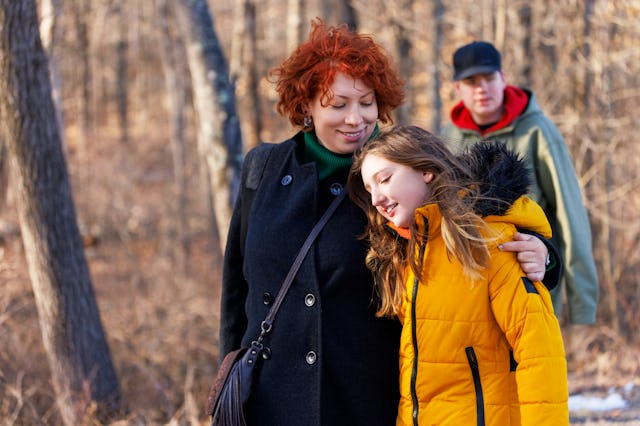The Same Advice You Used On Toddler Tantrums? It Works On Tweens, Too
And it’s as simple as it ever was.

Toddler tantrums and meltdowns are to be expected. You know they're going to happen, and it's why you'll do anything to prevent your 2-year-old from seeing that you sliced their banana vertically instead of horizontally. When people see your toddler shrieking in Target, a few will judge, but most people get it — toddlers get a pass, you know? But for older kids losing their sh*t, like tweens who now have the capacity to communicate but still aren't sure how to do that, things get hairy.
Not that a tween throwing themselves on the floor and pounding their feet over waffles instead of pancakes for breakfast is the norm, but tweens who feel blah, who are snappy with you, who feel emotional and don't know why — they need some of that gentle love you had for them when they were toddlers. They need to know they're loved, safe, and cared for, too.
And that's why the "add water, or go outside" rule still applies even when your kids feel impossibly big.
It was one of the first pieces of advice I ever received as a new parent — and it has always, always worked. As a new mom who felt overwhelmed, taking a shower or drinking a cup of coffee on the front porch could fix almost anything. When I was faced with hours of unstructured time as a work-from-home mom with a toddler, the water table was a miracle. (And then you could combine water and outside time.)
And now, as a mother of a 10-year-old on the cusp of 11, the old advice still works. Add water or go outside — it somehow always manages to fix whatever mood has my tween feeling a little less than herself. Bonus: It's absolutely rooted in science.
"I say there is a trifecta to help change your state," Kathryn Stamoulis, PhD, LMHC, tells Scary Mommy. "Go outside. Add water. Exercise. Pick one." Stamoulis says there is research to support all of these strategies for reducing stress and feeling calm. "In terms of water, studies have shown that splashing cold water on the face or holding an ice cube can slow the heart rate. Overall, taking a shower or bath centers oneself and focuses on the here and now by attuning to the temperature and physical sensation of the water. Nature decreases cortisol; exercise increases serotonin." When it comes to tweens, Stamoulis says removing them from the stress (and the screens) can provide a sense of control in a private, calming space.
Because tween tantrums can present themselves more subtly than a toddler's freakout, sometimes it's easy to think they'll just work it out on their own. With my tween, I'll notice she's seeming more emotional than usual, crying over things she usually doesn't, or feeling "bored" — which is really just her holding a lot of emotions and feeling unsure about what to do with them.
"A tantrum is a sign of overwhelm, and with the surge of new hormones during the tween years, this overwhelm is completely understandable," Stamoulis says. "As much as possible, try not to react emotionally — staying calm not only models self-regulation but also helps reduce feelings of shame surrounding the outburst."
She says the tween years are an ideal time to create some clear boundaries, such as requiring your tween to be in their room when they're having a bit of a meltdown, and to keep them from lashing out at others or destroying things. She does recommend that if these boundaries aren't respected or the tantrums frequently occur outside the safety of home, it may be time for professional help.
But don't feel like all of your tween's meltdowns need to result in punishments or even things like limited screen time. "I don't think enough research has been done on screens and its impact on the brain. Everyone is different, and for some kids it increases overwhelm, agitation, and emotional dysregulation," Stamoulis says.
You can focus on easy grounding ideas "for the trifecta" to help your tween feel secure and calm and regulated. Stamoulis recommends jumping jacks, running around the house, and planks for exercise ideas. "I really like the planks because it can be a personal challenge for a kid to see how long they can go while exerting a lot of energy." For water, tell your tween to take a bath or a shower, splash water on their face, or go look at a body of water if it's an option. Even a running fountain, Stamoulis says, can have a calming effect proven by research.
And if you want to get them outside? Just have them stare up at the sky: "It's calming and often puts problems into perspective."
Above all, you really don't have to complicate your tween's tantrums or overwhelm. Calm voices, controlling your own reaction, and relying on those simple ideas to help calm them can really make a difference. Take a walk with them. Watch the rain. Maybe all that calmness will encourage them to break down how they're feeling — and then share it with you.